The most commo - Study guides, Class notes & Summaries
Looking for the best study guides, study notes and summaries about The most commo? On this page you'll find 250 study documents about The most commo.
All 250 results
Sort by
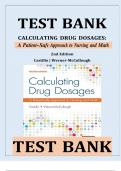
-
TEST BANK CALCULATING DRUG DOSAGES: A PATIENT-SAFE APPROACH TO NURSING AND MATH 2ND EDITION BY CASTILLO, WERNER-MCCULLOUGH ISBN- 9781719641227 This is a Test Bank (Study Questions and Answers) to help you understand the most common math concepts used in
- Exam (elaborations) • 204 pages • 2023
-
- $16.49
- 9x sold
- + learn more
Chapter 1: Safety in Medication Administration Castillo: Calculating Drug Dosages: A Patient-Safe Approach to Nursing and Math 2nd Edition MULTIPLE CHOICE 1. The following medication order is in the patient’s medication administration record (MAR): methylPREDnisolone 40 mg PO daily at 0900. After reading the order, the nurse correctly determines: A “PO” is an inappropriate abbreviation. B the medication order is written correctly. C 40 mg should be written as 40mg. D tall ...
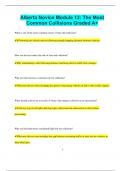
-
Alberta Novice Module 13: The Most Common Collisions Graded A+
- Exam (elaborations) • 7 pages • 2024
-
Available in package deal
-
- $9.99
- + learn more
Alberta Novice Module 13: The Most Common Collisions Graded A+ What is one of the most common causes of rear-end collisions? Following too closely and not allowing enough stopping distance between vehicles. How can drivers reduce the risk of rear-end collisions? By maintaining a safe following distance and being alert to traffic flow changes. Why are intersections a common site for collisions? Because drivers often misjudge the speed of oncoming vehicles or fail to obey traffic signals. ...
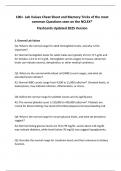
-
100+ Lab Values Cheat Sheet and Memory Tricks of the most common Questions seen on the NCLEX® Flashcards Updated 2025 Version.
- Exam (elaborations) • 19 pages • 2024
-
Available in package deal
-
- $12.99
- + learn more
1. General Lab Values Q1: What is the normal range for serum sodium levels? A) 135-145 mEq/L B) 3.5-5.0 mEq/L C) 70-100 mg/dL D) 8.5-10.5 mg/dL Answer: A) 135-145 mEq/L Elaboration: Serum sodium levels are crucial for maintaining fluid balance and nerve function. Values outside this range can indicate dehydration, kidney issues, or other medical conditions. 2. Electrolytes Q2: Which electrolyte is primarily responsible for maintaining cardiac rhythm? A) Calcium B) Sodium C) Potas...
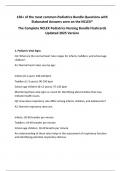
-
150+ of the most common Pediatrics Bundle Questions with Elaborated Answers seen on the NCLEX® The Complete NCLEX Pediatrics Nursing Bundle Flashcards Updated 2025 Version.
- Exam (elaborations) • 60 pages • 2024
-
Available in package deal
-
- $15.99
- + learn more
1. Pediatric Vital Signs Q1: What is the normal range for a resting heart rate in a 2-year-old child? A) 60-100 bpm B) 80-120 bpm C) 100-140 bpm D) 120-160 bpm Answer: B) 80-120 bpm Elaboration: The normal resting heart rate for toddlers (1-3 years) is typically between 80 and 120 beats per minute. 2. Piaget's Stages of Cognitive Development Q2: At what stage of Piaget's cognitive development do children begin to think logically about concrete events? A) Sensorimotor B) Preopera...
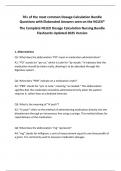
-
70+ of the most common Dosage Calculation Bundle Questions with Elaborated Answers seen on the NCLEX® The Complete NCLEX Dosage Calculation Nursing Bundle Flashcards Updated 2025 Version
- Exam (elaborations) • 26 pages • 2024
-
Available in package deal
-
- $12.49
- + learn more
1. Abbreviations Q1: What does the abbreviation "IM" stand for in medication administration? A) Intramuscular B) Intravenous C) Intraosseous D) Inhalation Answer: A) Intramuscular Elaboration: "IM" refers to the intramuscular route of administration, where medication is injected directly into a muscle. 2. Conversion Overview (Volume & Weight) Q2: How many milliliters are in 0.5 liters? A) 50 mL B) 100 mL C) 500 mL D) 1000 mL Answer: C) 500 mL Elaboration: There are 1000 ...
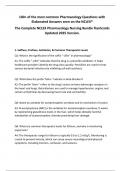
-
100+ of the most common Pharmacology Questions with Elaborated Answers seen on the NCLEX® The Complete NCLEX Pharmacology Nursing Bundle Flashcards Updated 2025 Version.
- Exam (elaborations) • 24 pages • 2024
-
Available in package deal
-
- $15.49
- + learn more
Suffixes, Prefixes, Antidotes, & Common Therapeutic Levels Q1: Which of the following suffixes indicates that a drug is a beta-blocker? A) -pril B) -olol C) -statin D) -cillin Answer: B) -olol Elaboration: The suffix “-olol” is commonly used for beta-blockers, which are medications that block beta-adrenergic receptors, leading to decreased heart rate and blood pressure. Pain Management Drugs (NSAIDs, Opioid Analgesics) Q2: Which medication is classified as a nonsteroidal anti-in...
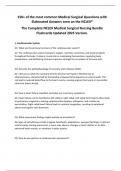
-
150+ of the most common Medical Surgical Questions with Elaborated Answers seen on the NCLEX® The Complete NCLEX Medical Surgical Nursing Bundle Flashcards Updated 2025 Version.
- Exam (elaborations) • 34 pages • 2024
-
Available in package deal
-
- $15.49
- + learn more
Endocrine Q1: Which hormone is primarily responsible for regulating blood glucose levels? A) Insulin B) Cortisol C) Thyroxine D) Glucagon Answer: A) Insulin Elaboration: Insulin, produced by the pancreas, lowers blood glucose levels by facilitating the uptake of glucose into the body's cells. In diabetes, this regulation is impaired. Diabetes Type 1 & 2 Q2: A patient with Type 2 diabetes is prescribed Metformin. What is the primary action of this medication? A) Increases insulin p...
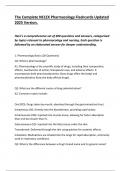
-
150+ of the most common Pharmacology Bundle Questions with Elaborated Answers seen on the NCLEX® The Complete NCLEX Pharmacology Nursing Bundle Flashcards Updated 2025 Version
- Exam (elaborations) • 40 pages • 2024
-
Available in package deal
-
- $15.49
- + learn more
1. Suffixes, Prefixes, Antidotes, & Common Therapeutic Levels Question 1: What suffix is commonly associated with beta-blockers? A) -pril B) -olol C) -cillin D) -pine Answer: B) -olol Elaboration: Beta-blockers, such as metoprolol and atenolol, are often identified by the suffix -olol, indicating their action in blocking beta-adrenergic receptors. 2. Pain Management Drugs (NSAIDs, Opioid Analgesics) Question 2: Which of the following is a common side effect of NSAIDs? A) Sedation...
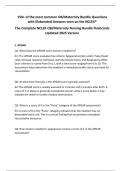
-
150+ of the most common OB.Maternity Bundle Questions with Elaborated Answers seen on the NCLEX® The Complete NCLEX OB.Maternity Nursing Bundle Flashcards Updated 2025 Version.
- Exam (elaborations) • 34 pages • 2024
-
Available in package deal
-
- $15.49
- + learn more
1. APGAR Q1: What does the "P" in the APGAR score stand for? A) Pulse B) Pressure C) Position D) Prolapse Answer: A) Pulse Elaboration: The APGAR score evaluates five criteria (Appearance, Pulse, Grimace, Activity, and Respiration) to assess the health of a newborn at one and five minutes after birth. The "P" specifically refers to the heart rate (pulse). 2. Acronyms Q2: What does the acronym "LMP" stand for in obstetric terms? A) Last Menstrual Period B) Labor Management Pl...
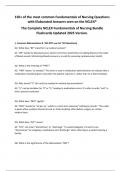
-
150+ of the most common Fundamentals of Nursing Questions with Elaborated Answers seen on the NCLEX® The Complete NCLEX Fundamentals of Nursing Bundle Flashcards Updated 2025 Version.
- Exam (elaborations) • 29 pages • 2024
-
Available in package deal
-
- $15.49
- + learn more
Common Abbreviations & "DO NOT use list" Q1: What does the abbreviation "NPO" stand for? A) Nothing by mouth B) Nutrition provided orally C) No past orders D) Normal patient output Answer: A) Nothing by mouth Elaboration: NPO is a medical abbreviation meaning the patient should not take anything by mouth, often used before surgery or certain medical procedures. Priority Questions Q2: In a triage situation, which patient should the nurse assess first? A) A patient with a spraine...

Do you wonder why so many students wear nice clothes, have money to spare and enjoy tons of free time? Well, they sell on Stuvia! Imagine your study notes being downloaded a dozen times for $15 each. Every. Single. Day. Discover all about earning on Stuvia


